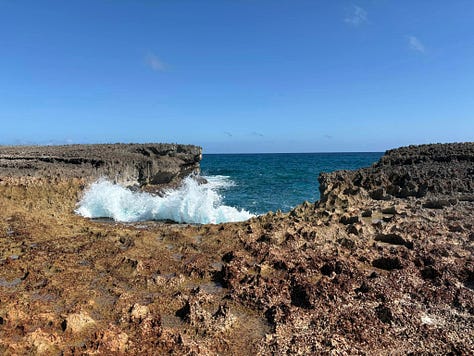Sailing on the Wind
My father, who’s in his 70s, recently returned home after two months of sailing. He and the captain sailed down the Intracoastal Canal of Florida to Miami. From there, he crossed the Straits of Florida to reach Grand Bahama. After weeks of sailing from one cay to another, filling their hearts full of adventure, conch shells, and shark sightings, they returned safely to America. Thanks to a GPS app called PredictWind, I could watch his progress every step of the way. As interesting as all the exploration and photos were, I was amazed by the app’s real-time data on the wind. Their boat, Aletheia, was governed by that unseen force of air made visible only by satellites and digital predictive algorithms. You'll see what I mean if you click on the link above. The world’s winds are in constant motion, and sailboats like the Aletheia are only along for the ride. The captain’s skill in sailing came not from a force of will but from a wisdom of riding the wind.





What comes to your mind when you envision the Holy Spirit? Is it the dove at Jesus’s baptism, the fire of Pentecost, or the living water that satisfies and cleanses us? Those are all true. But the Spirit of God is also described as the wind hovering over creation (Genesis 1:2). He is the unseen force coursing over land and water. God’s Spirit is the current by which the path of history flows. Such imagery makes it difficult to grasp what we believe when Christians confess the Apostles’ Creed, saying, “I believe in the Holy Spirit.”
The Holy Spirit is Holy and Spirit. He’s holy, meaning He is divine. He’s sacred, deserving absolute reverence. Holiness means complete purity. As light is devoid of darkness, so is the Holy Spirit devoid of sin. The third person of the Godhead is also Spirit—or ghost in the Old English meaning. This Spirit isn’t bound by the physical and doesn’t play by our natural rules. So, the Holy Ghost is deity and entirely outside of our control. Yet, throughout Scripture, the Spirit’s only aim is to obey the Father and glorify the Son. The Spirit resonates the unity within the Trinity.

Ghost Hunters
There is a 50/50 shot that you believe in ghosts! Nearly half of Americans believe in the paranormal. This is way up from the ’90s, when only one in four of you believed in Casper. Women, by the way, are more likely than men to say they’ve experienced paranormal activity. But here’s a question: If you believe in Jesus and the Bible as God’s Word, do you think that percentage goes up or down? Again, if you’re a Christian, are you more likely to believe in ghosts or less likely? Polls show that Christians are less likely to believe! LifeWay in 2013 said that only 15% of evangelicals believe in ghosts. That’s surprising! Shouldn’t the people who believe in the afterlife, the soul, the devil, demons, and THE HOLY SPIRIT also believe in ghosts?
There is evidence of a type of ghost in the Bible. God allows Samuel’s return in “ghost” form in 1 Samuel 28:7-20. But we read that even the witch of Endor was surprised by her summoning. We see the disciples’ fear of ghosts when Jesus walked on water (Matthew 14:25), but again, their fear turned to awe and wonder when they saw Jesus walking on waves. Then there’s the Holy Ghost, but He isn’t a ghost as we know them today. The Bible affirms a spiritual realm, but the lingering spirits of the dead are largely not the ghosts our Jewish forefathers envisioned.

Christians believe something even crazier than an undead spirit haunting my child’s bedroom closet. We believe the Holy Spirit dwells in us. We have a sin-destroying, life-giving, visible yet invisible, whirlwind and earth-forming power living inside us. God’s gift, sent by Jesus Himself, is now in those who believe. God gave us the ability to possess that which we cannot hold. My only sin defense against being overcome by the Spirit’s greatness is trying not to think about Him. Because we can’t get our grip on the Holy Spirit, we choose to lose our grip completely. Our thoughtlessness is dangerously close to the worst sin seen in Scripture! Jesus said concerning the Holy Spirit in Matthew 12:31, “Every sin and blasphemy (evil, abuse, harmful speech, or disrespect) can be forgiven men, but rejection of the [Holy] Spirit shall not and cannot be forgiven.”
Christians don’t fear this verse. They’ve accepted the Holy Spirit, and the Spirit itself promises never to leave them. But how often have we rejected the Spirit’s prompting? Can we even sense the world’s Creator within us anymore? If I believe anything, it’s that Christians everywhere fail to have the sensitivity needed to hear the Holy Spirit’s prompting. We have lost our ear for the music. Week after week, we fail to feel His breeze. But there is hope. Repentance starts with the prompting of the Holy Spirit.
Confessing Sin
Beloved, would we wake up to the greatness of God’s presence living in us? Would we turn and follow Jesus, as revealed by the Spirit, and return to His everlasting presence?
Will you pray with me?
Holy Spirit, You are the unseen wind that moves through creation, yet we resist Your leading. You speak, but we ignore; You stir, but we stand still. Forgive our dullness of heart and restore our sensitivity to Your presence. Teach us to ride the wind of Your will, surrendering to the currents of Your grace. Lead us back to Christ, that we may walk in step with You.
Amen!
Thanks for praying; God Bless You! I hope you’ll read and pray with us next Saturday at 8:30 a.m. (NEW TIME)




Sailors call it a “Rage,” when sea currents oppose the wind. When you witness these swells, you know His might.